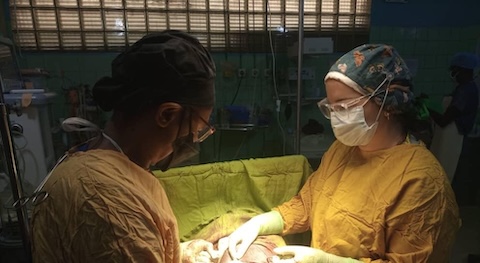Ina Bodinaku, MD: Greater Lawrence Family Health Center, Family Medicine PGY3
Ghana: March 2025

Driving through the unpaved roads and the villages leading up to Northern Ghana, I remember seeing children running through the streets shoeless while others laid down underneath the shades of trees seeking refuge from the burning hot sun. As we drove closer and closer to Baptist Medical Center, I started to feel nervous and overwhelmed. Countless doubts sprung into my mind: “How am I going to help the people of Nalerigu? Is my work here going to make a difference in their lives? Do I have what it takes?”
On our first day in the hospital, a long line of patients of all ages awaited us just outside the theater (operating room). One of our first patients was a young subsistence farmer from a local village with a history of untreated hepatitis B who had presented with diffuse abdominal pain and weight loss. As I palpated the irregularly shaped, firm mass that had invaded his abdomen, I started to list out the labs I was planning to order for a suspected diagnosis of metastatic liver cancer when my attending stopped me mid-sentence. He noted that this would not be possible. This was a diagnosis of which we would never be certain as our patient could not afford any further workup or treatment, even if there were any available to pursue. I was heartbroken and tears swelled up in my eyes as we explained all of this to our young patient and his family, knowing the overall prognosis was poor.
Later in the day, we received a new consultation. A 7-year-old girl had come in with an acute abdomen, likely from a microperforation of her bowel caused by typhoid fever. As I pressed the ultrasound probe closer to her liver to look for any free fluid in her abdomen, the patient’s mom revealed to me that this was not the first time she had been hospitalized for this same issue. I was frustrated knowing that this condition could have been prevented if our patient had access to safe, clean drinking water.
By the end of just my first day, I felt defeated and powerless against the larger inequities greatly affecting the health and well-being of the people and patients of Nalerigu. As much as I felt discouraged, the team of physicians and hospital staff at Baptist Medical Center equally inspired me. Despite all of the odds stacked against them, they found unique and sustainable ways to face the challenges and continue to provide the best care possible for their community. I saw no better example of this than in the operating room. Despite the lights going out for the 5th time during a Cesarean section, despite the needle driver malfunctioning mid-stich, despite the limitations on the amount of suture available for the case and many other countless barriers, everyone remained committed to providing the best care possible under the circumstances. When asked about his views on global health equity, Dr. Paul Farmer once said, “In a world riven by inequity, medicine could be viewed as social justice work.” By the end of my trip to Ghana, Dr. Farmer’s words truly resonated with me. Despite feeling helpless against the inequities that persist around the world, I do believe that being in Nalerigu and providing direct patient care was perhaps one small drop in the ocean of all the work that remains to be done in order to dismantle the systems that keep these inequities at play. I hope to continue this social justice work of providing healthcare to global communities that need it most in my future career.